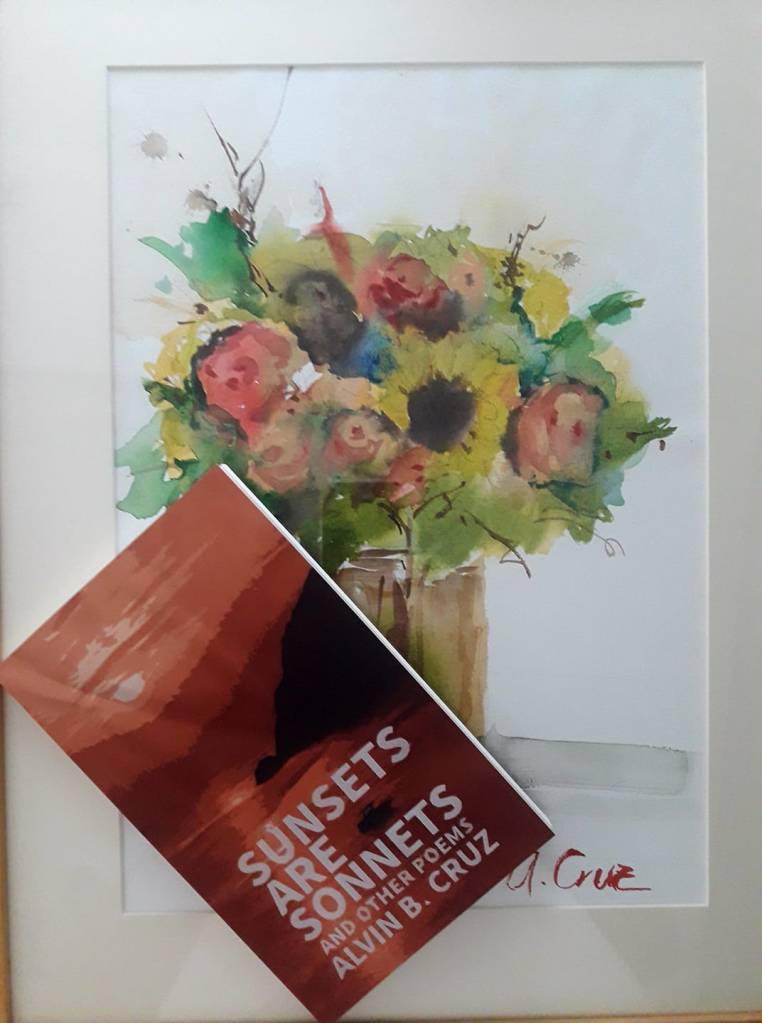
Reviewed by Ami Granada
As you open Alvin B. Cruz’ collection of poetry and haiku, you enter a world of the poet’s creation.
He embraces the free verse, forming the shape of his poems with no formal restrictions. However, the rhythm is inherent in the pacing and word count. He combines lyricism and inventiveness, often playing with words, and in the seeming lightness of the words, underneath we find deeper meaning.
Alvin Cruz was inspired to pursue writing in poetry form when he was published in Philippine Graphic whose literary editor then was the national artist Nick Joaquin. He remembered the terse “No!” across the page of his poem written by Joaquin. But this did not deter the young poet. In the subsequent editions of the magazine, the national artist and the young poet had a “truce” when finally his poems became a regular in the magazine’s literary page.
Mentored by another national artist, Francisco Arcellana in Advanced Poetry writing class during his college days in UP Diliman, Cruz further honed his talent. The young poet greatly impressed his teacher that his works were often singled out in class.
“Truth is a ghost with many skins”, says the author in The Hunting Season, one of his free verses, “real but invisible, like the deer camouflaged by the woods”. In his search for truth and his own identity, he is petrified of how truth is different for different people. “What we cannot see has covered us- not that we are blind to the truth”, but that we disguise ourselves. “Both hunter and hunted seeking disguises”. We know the truth but do we want the truth?I can almost hear Jack Nicholson’s voice, “You can’t handle the truth!”
Hidden under the guise of poetic expression, Cruz wove his life into his compositions, hoping truth will blur into the lines. But fiction and fact bled into each other. In a young person’s life, how important it was to be visible yet invisible, to express and still retain a mystery.
In the opening lines of the poem Crossings, it is not as we may first surmise a path one crosses, but an encounter.This theme resonates in many of his poems. Encounters defining many of his regrets, as in when he waited under the streetlights as “a thousand needles” of raindrops fell on his head and shattered his heart.
One of the most remarkable poems in the collection is No Words. It is a free flowing verse that enjambs until the last few lines. More like what the poet says, a scream that one can only let out until it dies a natural death.
The poem Tea Ceremony is another of such meetings. This time, a flirtatious encounter gives the poet a moment of reflection on casual meetings. He confesses the tea ceremony has its own life, something that breathes on its own:
The ceremony exists apart from its participants.
Self absorbed like us in its habiliments
Of Raku bowls and tea cups, tea leaves and flowers.
Here the poet gains a mastery of the genre as he skilfully paints the imagery. The ceremony is “self absorbed “ like a person. And its “habiliments “ of Raku bowls and tea cups create a serene moment, concrete words that added texture to the lines, almost palpable to the touch.
In his stint in Aichi, Japan as an English teacher he was able to appreciate the changing seasons. Perhaps after a long solitary life which he filled with exotic places and friendships, the poet found his niche, the Haiku.
Studying the haiku master Matsuo Basho, Cruz comes up with startling images that capture the essence of the Aichi landscape, particularly autumn. .
Recently, the Wales Haiku Journal, an international online magazine specifically for modern haikus, published Cruz’ haikus which the poet wrote during his stint in Japan.
The poet delves into other forms of art as he wields his paintbrush in this haiku:
Painted morning sky
Like water colored sunrise
A new day unfolds
The terse structure of the poetic form conveys a profound thought, forcing the poet to be succinct and yet somehow liberates him upon reaching a zen conclusion. Like an existential poetic therapy.
Folded paper cranes
How many more for a wish
To grow wings and fly
The poet refuses to tell his own love story. He instead expresses the times in between or the aftermath. Or perhaps he only wants to show his love story with himself and his reader.
In the matters of the heart,I want to single out this one haiku that renders my own heart into pieces:
Written on water
A hundred and one haiku
Love not long enough
I am a little bemused at how the poet reins in with effort, allowing us, the readers, just a glimpse of otherwise intoxicating impressions. We have barely scratched the surface of this writer. His book of poems is not a punctuation but more of ellipses for more things to come.
Needless to say, read this book with a cup of tea or coffee on a drizzly afternoon, like I did, with the sun slanting towards an ivy covered wall. Experience it. It is to be savored, like looking at
Broken stone and glass,
a mosaic of feelings
hidden deep within.
~~~~~~~~~~~~~~~~~~~~~~~~~0~0~~~~~~~~~~~~~~~~~~~~~~~~
Published by Central Books Supply Inc. December 2020
Thank you Ami de Manila for this beautifully written review of my book. Your words and my poems are magically woven together…like a dreamcatcher. More power to your blog and good luck on your upcoming book!